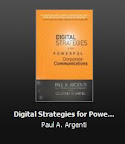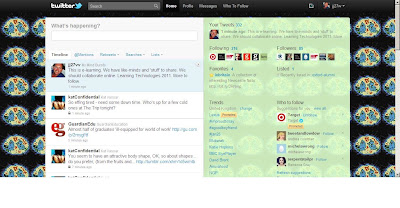It'll not come from one book, or two or many. Having blogged for 11 years and six months I should know some things. I share some ideas here alongside some thoughts from Argenti and Barnes's 2009 book 'Digital Strategies for Powerfurl Corporate Communications' that I have read cover to cover these last few days courtesy of Kindle.

Digital Strategies for Powerful Corporate Communications
Blogs and social communities have sparked ‘a complete overhaul of the business environment, especially in the context of communication.’ Agenti and Barnes (2009:K168)
K = Kindle ... they don't give a page number. How could you in a e-Book?
Education is changing too, blurring the lines between school and the workplace, and encouraging workplace learning with distance learning specialists and online courses from members of the Association of Business Schools surely set to grow
The difference between web 1.0 and web 2.0 – observation versus participation, status versus dynamic, monologue versus conversation. Agenti and Barnes (2009)
What is most relevant to corporate communications managers is as relevant to other institutions, whether government, education or charity.

You need to be using:
• Blogs (such as WordPress. Edublogs, Diaryland)
• Microblogs (Twitter)
• Social Networks (such as Facebook, MySpace)
• Video-sharing platforms (YouTube, Vimeo)
• Search engine marketing and optimization
• Corporate web sites/ online newsrooms
• Wikis • Mash-ups • Viral/word-of-mouth (WOM) marketing.
The trick is to find ‘a middle ground between a completely centralised and a wholly decentralised structure is the best way to maintain an effective communications strategy in today’s environment.’ K593
My take on this is that to succeed organisations need to be:
• Informed
• Engaged
• Responsive
• Frequent
• Authentic
• Relevant
• Appropriate
• Pithy
• Real (neither journalistic, corporate or academic in style)
• Understanding
• Passionate but not obsessive
• Media Savvy
• Connected
• Tooled up
• With a give, take, try anything and receive mentality.
• Tag it all
• Optimise out of habit
• Have fun, be playful with surveys, questionnaires and polls.
The view Sir Martin Sorrell takes is ‘The more control you keep over the message, the less credible it is. And Vice Versa.’ Martin Sorrell (2008: K1520)
There are three skills sets required to take advantage of this:
1. Identifying influential bloggers 2. Building relationships with them 3. Engaging with them with the intent of receiving positive coverage
Points 1 and 2 was the experience I had in Diaryland.
Here from 1999 bloggers teamed up with designers, where the two functions were recognised as different, like the copywriter and art director in advertising. Here you could form groups and join groups, link to friends for a myriad of reasons, but best of, in the list limited to 70 friends you were/are updated constantly on the status – it helps to know that you’re in a group where people update regularly. It is largely from the community of those who write, that you find people who also read and comment, they are various consumers and emitters of content.
So much that I experienced here has migrated to other blogsites.
Things that work, as well as buddies and buddy updates, are the surveys and groups, creating engaging or fund questionnaires to share with others and forming groups too, where for example I set up lists for those to be the first to make 500, then 1000 and then 2000 entries … Fun too are the banner ads you can make and use to promote interest within the Diaryland community. Perhaps Andrew’s (its creator’s0refusal to allow advertising is what is causing a Diaryland demise.
‘Metaphorically speaking, RSS is the gateway drug of experiential online monitoring’. Agenti and Barnes (2009:K1183)
My view is GoogleAlerts does this better, it spread the net for you, whereas with RSS you need to have found the feed first. What is more GoogleAlerts feeds you snacks of information that are easy to consume, note, reference, keep, pass on or over.
In emails the authors interviewed Courtney Barnes and Shabbir Imber Safdar.
‘You need to understand that it’s not a cut-and-paste job. You need to participate in the conversation and adapt the content for the environment. ‘ Thus said (Agenti and Barnes (2009:K1159)
Look, listen and learn ... engage
To do this engagement is the first things, so blogs and Twitter, social networking and video, photographs … even some family history and reuniting with school and college friends. Then you tools like Technorati and Goole Alerts.

Technorati
Google Alerts
Search out appropriate keywords
Joined Linked In too.
Having been engaged with four/five groups I made the mistake of joining and dozen and will have to drop most of these. Some post several times and hour 24/7 and I have ceased to see the worth of reading that much from one group, especially if the same question is being answered a thousand times. Managing this maelstrom is a task in itself, being alert to the new, dropping the redundant, buying into and out of the right people and places as their influence and quality of comment waxes and wanes.
Forrester Research on 90 blogs of Fortune 500 companies. June 2008.
Most company blogs are ‘dull, drab and don’t stimulate discussion’. • 66% rarely get comments • 70% only contain comment on business topics • 56% republish press releases or summarise news that is already public.
REFERENCE
Argenti P.A. and Barnes M.C. 2009 ‘Digital Strategies for Powerful Corporate Communications’ McGrawHill.
Sorrell. M (2008) ‘Public Relations: The Story behind a Remarkable Renaissance,@ Institute for Public Relations Annual Distinguished Lecture, New York, November 5, 2008.
Meanwhile I've got these two to read.

And why books cover to cover?
I'm sick of snacking from a smorgasbord. I want a consistent voice, something up to date, that leaves an impression. A book does this for me, an article never does.
A year later
‘You need to understand that it’s not a cut-and-paste job. You need to participate in the conversation and adapt the content for the environment.' This said in Digital Strategies for Powerful Corporate Communications' Agenti and Barnes (2009:Kindle page 1159).
As I go through 33 months of postgraduate blog posts (the Masters in Open and Distance Education with the Open University), I stumble upon a great deal that some might call aggregation, but a year or so ago was linking and tagging.
In the module 'Innovations in e-learning' we were give a list of aggregating tools to try. Personally, the curator - and potentially their team, as in the real world of museums and galleries must surely add value above and beyond the mere pulling of content using a set of terms in an off-the-shelf bundle of software?
Over the last week or so since the meet up I have returned to various tools and tried new ones. I've gathered screen grabs and given it some thought - and largely concluded that as a result of this exercise I will be dropping them all in favour of reading a few choice blogs and receiving feeds from them - blogs where an opinion is expressed, you can leave a comment and expect feedback. At the heart of this is socially constructed learning.

